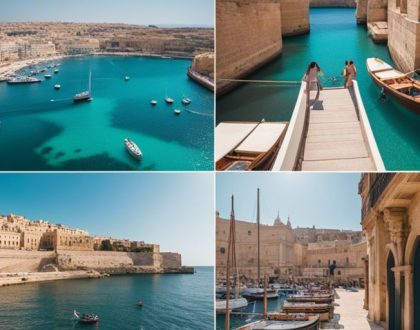Your Finance Guide for Living in Malta

Just relocated to Malta or planning to make the beautiful island your home? Navigating your finances is crucial for a smooth transition. From banking and taxes to cost of living and investment opportunities, this guide will provide you with crucial information to help you manage your finances efficiently while living in Malta. Understanding tax regulations and residency requirements is paramount to avoid financial pitfalls, while also exploring investment options can potentially grow your wealth in this desirable Mediterranean destination.
Overview of Malta's Financial Landscape
While Malta is known for its stunning beaches and rich history, the island nation also boasts a robust financial landscape that caters to residents and expats alike. Understanding the key elements of Malta’s financial system is crucial for anyone looking to establish themselves in this Mediterranean gem.
The Currency and Banking System in Malta
Some key points to note about Malta’s financial landscape include its currency and banking system. The official currency of Malta is the Euro, making transactions and daily expenses seamless for those coming from other European countries. The country is home to several local and international banks, providing a range of financial services such as savings accounts, loans, and investment opportunities.
Regulatory Bodies and Financial Security
Some regulatory bodies oversee Malta’s financial sector, ensuring transparency and security for consumers. The Malta Financial Services Authority (MFSA) is the primary regulatory body responsible for regulating financial services in the country, including banking, investment, and insurance. The MFSA works to ensure that financial institutions comply with regulations and operate ethically to protect the interests of consumers and maintain the stability of the financial system.
Clearly, Malta values financial security and consumer protection, which is evident in the strict oversight provided by regulatory bodies. Expats and residents can enjoy peace of mind knowing that their financial transactions are safeguarded by institutions such as the MFSA, which play a crucial role in maintaining the integrity of Malta’s financial landscape.
Types of Financial Services Available in Malta
You have plenty of options when it comes to financial services in Malta. From retail banking to investment and wealth management, there are various avenues for managing your finances effectively in this European country. Understanding the different types of financial services available can help you make informed decisions about your money.
Retail Banking Services and Offerings
Some of the major banks in Malta offer a wide range of retail banking services to cater to the needs of residents and expatriates alike. These services include current accounts, savings accounts, loans, credit cards, and more. With online banking becoming increasingly popular, most banks in Malta also provide internet and mobile banking facilities for convenient access to your accounts.
Investment and Wealth Management Options
Some of the trusted financial institutions in Malta offer various investment and wealth management options to help you grow your money over time. These services may include investment portfolios, asset management, retirement planning, and more. It is imperative to carefully assess your financial goals and risk tolerance before choosing an investment strategy that suits your needs.
Offerings in the investment and wealth management sector in Malta can provide you with an opportunity to diversify your portfolio, maximize returns, and secure your financial future. However, it is crucial to seek advice from qualified financial advisors and conduct thorough research to avoid potential risks associated with investing.
| Retail Banking Services | Current accounts, savings accounts, loans, credit cards, online and mobile banking facilities |
| Investment and Wealth Management Options | Investment portfolios, asset management, retirement planning, diversification |
Cost of Living Analysis in Malta
Housing: Renting vs. Buying
With the rising cost of real estate in Malta, many expats and locals are faced with the decision of whether to rent or buy a property. Renting a property in Malta can be a more convenient option for those who are not looking to settle down permanently. It offers flexibility in terms of being able to move easily without the hassle of selling a property. However, buying a property can be a smart investment in the long run, especially with property prices steadily increasing over the years.
Utilities, Groceries, and Other Day-to-Day Expenses
Cost of utilities, groceries, and other day-to-day expenses in Malta can vary depending on your lifestyle choices. Utilities such as electricity, water, and internet are generally affordable, but can add up quickly if usage is excessive. Groceries are reasonably priced, with a variety of local and imported products available in supermarkets. Other day-to-day expenses like dining out, transportation, and entertainment can also impact your overall cost of living in Malta.
Renting a property in Malta may include some utilities in the rental price, such as water or internet. It’s important to budget accordingly for additional expenses, such as electricity or heating, which may not be included in the rent. Being mindful of your consumption can help you manage these costs effectively and optimize your budget for day-to-day expenses.
Tips for Managing Personal Finance in Malta
All individuals residing in Malta must efficiently manage their personal finances to ensure stability and security. Implementing proper budgeting and saving strategies, as well as understanding tax and social security contributions, are crucial components of successfully managing your finances in Malta.
Budgeting and Saving Strategies
You can achieve financial success by creating a comprehensive budget that outlines your income, expenses, and savings goals. Consider using digital tools or apps to track your spending and identify areas where you can cut back expenses. Prioritize building an emergency fund to cover unexpected costs and contribute regularly to a savings account. Set realistic financial goals and review your budget regularly to ensure you stay on track. This proactive approach will help you maintain financial stability and work towards your long-term aspirations.
Navigating Taxes and Social Security Contributions
You must familiarize yourself with Malta’s tax system and social security contributions to fulfill your obligations and avoid penalties. Understand the different tax brackets, deductions, and deadlines applicable to your income level. Seek advice from a financial advisor to optimize your tax planning strategies and ensure compliance with the law. Additionally, stay informed about social security contributions to secure benefits such as healthcare coverage and retirement provisions. By staying informed and proactively managing your tax and social security responsibilities, you can effectively plan your finances for the future.
Budgeting for taxes and social security contributions is vital to avoid financial setbacks and maintain compliance with Maltese laws. Dedicate a portion of your income towards these obligations each month to prevent any last-minute stress or difficulties. It is advisable to keep detailed records of your tax payments and contributions to facilitate smooth financial planning and ensure accurate reporting.
Step-by-Step Guide to Opening a Bank Account in Malta
Despite being a small island nation, Malta offers a wide array of banking options for residents and expats alike. Opening a bank account in Malta is a straightforward process that can be completed quickly and efficiently. Below is a detailed guide to help you navigate the process with ease.
| Choosing the Right Bank | Documentation and Process |
Little research can go a long way in helping you choose the right bank in Malta. Consider factors such as fees, services offered, reputation, and convenience of branch locations. Popular banks in Malta include Bank of Valletta, HSBC, and APS Bank. | There’s a specific set of documentation required to open a bank account in Malta. This typically includes a valid passport or ID card, proof of address, and proof of income. The process may vary slightly from bank to bank, so it’s advisable to contact your chosen bank in advance to confirm the exact requirements. |
Choosing the Right Bank
Little research can go a long way in helping you choose the right bank in Malta. Consider factors such as fees, services offered, reputation, and convenience of branch locations. Popular banks in Malta include Bank of Valletta, HSBC, and APS Bank.
Documentation and Process
There’s a specific set of documentation required to open a bank account in Malta. This typically includes a valid passport or ID card, proof of address, and proof of income. The process may vary slightly from bank to bank, so it’s advisable to contact your chosen bank in advance to confirm the exact requirements. Remember that providing false information or documents can lead to legal consequences, so it is crucial to be honest and accurate in your submission.
Bank accounts in Malta offer a range of benefits, including online banking facilities, competitive interest rates, and access to a network of ATMs across the island. By following the steps outlined above and ensuring you have all the necessary documentation in order, you can open a bank account in Malta efficiently and start managing your finances with ease.
Factors to Consider When Investing in Malta
After deciding to invest in Malta, it is crucial to consider various factors to ensure a successful investment journey in the country. The economic stability and strategic location of Malta make it an attractive destination for investors. However, it is important to conduct thorough research and consider the following aspects before making any investment decisions.
- Legal regulations: Understanding the legal framework and regulations pertaining to investments in Malta is crucial to avoid any potential legal issues.
- Market trends: Analyzing the market trends and potential growth sectors can help in making informed investment choices.
- Tax implications: Considering the tax implications of investments in Malta is important to optimize returns and comply with tax laws.
- Political stability: Assessing the political landscape and stability of Malta can mitigate any potential risks to investments.
Property Investment: Pros and Cons
Any prospective investor looking into property investments in Malta must weigh the pros and cons before making a decision. Here is a breakdown of the advantages and disadvantages of property investment in Malta:
| Pros | Cons |
| Diverse property options | High property prices |
| Stable property market | Complex legal procedures |
| Attractive rental yields | Fluctuating demand in certain areas |
Any investor should carefully consider these factors before plunging into property investment in Malta.
Business Ventures and Stock Market Opportunities
One important aspect for investors to explore in Malta is the business ventures and stock market opportunities. Malta offers various opportunities for establishing businesses and investing in the stock market, providing potential for growth and returns.
Malta’s strategic location within the European Union, coupled with its business-friendly environment, makes it an attractive hub for entrepreneurs and investors alike. The stock market in Malta also presents opportunities for diversification and investment growth.
Another crucial benefit of exploring business ventures and stock market opportunities in Malta is the potential to tap into diverse industries and international markets. However, it is important to conduct proper due diligence and seek professional advice to navigate the complexities of these investment avenues.
Pros and Cons of the Maltese Financial Climate
Unlike many other countries, Malta offers a unique financial climate for residents and expats. Understanding the pros and cons of the Maltese financial landscape is important for making informed decisions about managing your finances in this Mediterranean paradise.
| Benefits | Challenges |
| Low personal tax rates | High cost of living |
| Strategic location for business opportunities | Limited banking options for non-residents |
| Stable economy | Complex regulatory environment |
| Access to EU markets | Increasing property prices |
| Strong banking system | Limited investment choices |
Benefits of Financial Management in Malta
Clearly, one of the main benefits of financial management in Malta is the low personal tax rates. This can result in significant savings for both individuals and businesses operating on the island. Additionally, Malta’s strategic location for business opportunities in the heart of the Mediterranean makes it an attractive destination for entrepreneurs looking to expand their reach.
Challenges and Risks to Consider
Prospective residents should be aware of the high cost of living in Malta which can impact their budget and lifestyle choices. Furthermore, navigating the complex regulatory environment can be a challenge for those unfamiliar with Maltese financial laws and procedures.
When considering the Challenges and Risks to Consider, it’s important to note that while Malta offers a stable economy and strong banking system, the limited investment choices available may not meet the needs of all investors looking to diversify their portfolios.
Final Words
To wrap up, living in Malta can be a fantastic experience, but it’s imperative to have a solid understanding of the country’s financial landscape. By following the tips and guidelines outlined in this finance guide, you can navigate the various aspects of managing your finances and ensure a stable and comfortable lifestyle in Malta. Remember to budget wisely, seek out local financial advice when needed, and take advantage of the many opportunities for saving and investing that the country has to offer.
Recommended Posts

Malta's Tourism Rebound – What to Expect
April 29, 2024

Malta’s Natural Swimming Pools
April 29, 2024

